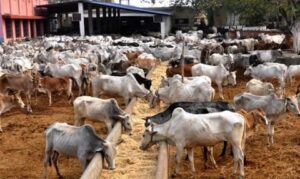THE Berom Educational and Cultural Organisation (BECO) has raised the alarm over what it called the expansionist agenda of Fulani herdsmen in Riyom and Barakin Ladi local government areas of Plateau State. The organisation claimed that no fewer than 55 communities have been forcibly taken over by the herdsmen.
The Plateau State government recently signed a law to discourage the trend where armed people would invade a land, claim ownership and forcibly occupy it.
The national president of BECO, Mr Gyang Dudu, who disclosed this to Saturday Tribune, said the inhabitants of these communities had been forced to flee to different parts of the state for refuge. He added that most of them were presently living with relations in Jos, the state capital, and headquarters of their respective local government areas.
Dudu said: “They were chased away from their ancestral communities. The Fulani herdsmen did not just occupy their houses and acquired their properties but they are now building more houses on their lands. We have petitioned the appropriate authorities but are yet to get response from them.
“The government is planning a census and demarcation. If the right atmosphere is not prepared for the natives to return to their ancestral communities, who are they going to count? Are they going to count foreign illegally occupants?
“The state government made a law against land grabbing but it seems enforcement has become a problem because these people are not deterred at all. We don’t want to take the law into our hands since the government has come up with this law but we are disappointed that the government is not implementing the law and working towards ensuring that these displaced people go back to their ancestral communities.”
The BECO leader, who claimed that land grabbing by foreign Fulani elements is gradually becoming a norm, implored the state and federal governments to address the situation.
“The government should be responsive. It is wrong for anyone or group to push the natives into exile.
“Most of the IDP camps have been closed. Our people are not even comfortable with the idea of living in these camps. Many of them are presently living with their relatives and loved ones in Jos and other places,” he added.
Also, the convener of the Emancipation Centre for Crisis Victims in Nigeria (ECCVN), Mr Dalyop Solomon Mwantiri, expressed disappointment that the state government was yet to implement the anti-land grabbing law. Mwantiri stated that the territorial agenda of the Fulani herders was becoming more intense because the legislation has not been tested.
He said: “I can tell you that no fewer than 55 villages have been sacked and occupied by these Fulani herdsmen in Riyom and Barakin Ladi local government areas alone. They are presently living there comfortably and even building more houses unmolested.
“We learnt that government is about to do registration of voters who are they going to count in such places? Are they going to count illegal occupants while the legal owners are in exile? They have started developing the lands while those who are supposed to stop them are looking the other way.
“My submission is that the government is giving legitimacy to illegality. As a result of the activities of these intruders, most of our people in these local governments can no longer access their farms. Those displaced have since left the IDP camps and living with their relations in Jos and other places.”
One of those displaced from Shonom village and who is now living with his cousin in Jos, Dauda Pam, said attempts by him and other displaced people to return to their village were resisted by the herders who unleashed terror on them on arrival.
When contacted, the state Commissioner of Information, Mr Daniel Majang, said it was because of developments like this that the state government signed anti-land grabbing bill into law. Majang implored those whose lands are being illegally occupied to approach the courts for redress.

Leave a Reply